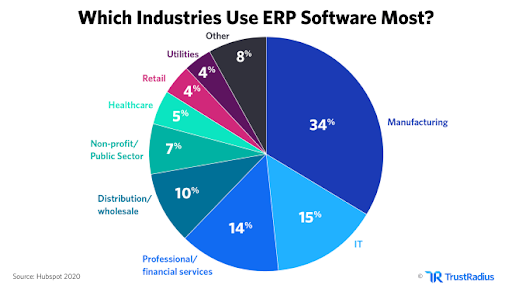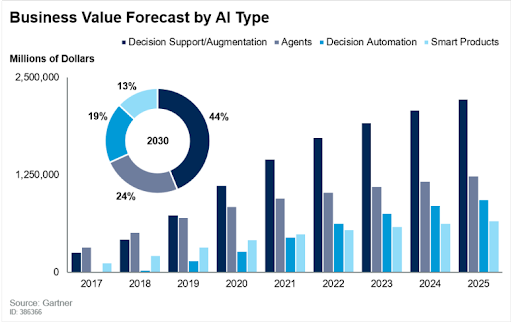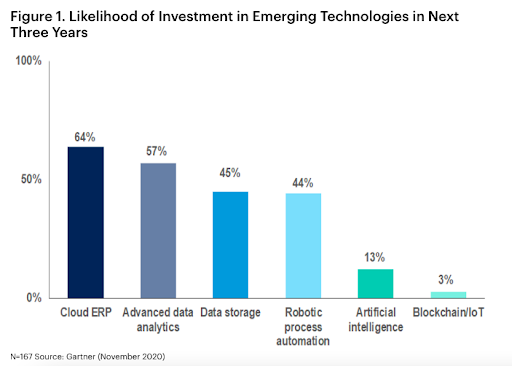Artificial intelligence has been changing the world around us in many ways. No, we aren’t quite living in the matrix, but we are interacting with Artificial Intelligence (AI) all the time. Many organizations are now turning to AI to improve sluggish Enterprise Resource Planning (ERP). AI can provide the processing power to deal with the increasing complexity of modern business needs.
This article will explore the impact of AI on ERP software and how it is revolutionizing this decades-old system.
Current Trends and Future Needs
Before considering the implications of AI in ERP, let’s crunch some numbers about the current use of AI and how this will change in the coming years. According to a recent study, the enterprise AI market size in 2022 was estimated at $16.81 billion. By 2030, it’s predicted to grow to $102.9 billion as a CAGR of 47.16%.
According to a report by IBM, AI adoption by businesses as a whole is at around 35%, a rise of 4% from the previous year. Such evidence indicates the importance attached to this by companies all over the world. And why is this?
One application of AI in ERP is increasing workplace efficiency and productivity to make companies more competitive. For instance, it is thought that 40% of the work of a sales representative could be done by AI, allowing these valued members of staff to focus on more complex tasks.
Such innovative technologies can put a company in a prime position for the future and in line with businesses that already have the right software engineer talent and are looking to use AI to help their ERP systems.

Businesses who currently use AI in any format, or are working towards having it.
What Is An ERP System?
Whilst the term itself dates back to the 1990s, companies have actually been using ERP management systems since the 1960s. It’s evolved greatly over time—and to many, AI is the next new innovation to improve efficiency.
An ERP system is the organized storage and use of information for the benefit of a company or organization. In layman’s terms, this allows enterprises to create a single database for all departments in an office or organization, uniting finance, accounting, supply, warehouse management, customer service, marketing, and more.
It offers services like simplified data entry, business processes, automation, reporting, and forecasting, all integral to driving profit. Combining this with AI will fundamentally change how these operations are managed.

Will More AI Actually Help?
Britannica defines AI as the “ability of a digital computer or computer-controlled robot to perform tasks commonly associated with humans.” AI services currently available to enterprises include chatbots, intelligent process automation, AI-enhanced financial planning, and automated data entry.
Using AI can benefit many departments and business processes, like accounting, analytics, data mining, sales automation, and warehouse management, by increasing productivity. It can also reduce human error when inputting data, cut operational costs, and enhance human capabilities by streamlining routine processes. Ultimately, this will reduce staff frustration and boredom while doing these menial tasks.
Challenges To Implementing AI
However, companies face certain obstacles to benefiting from these services fully. Firstly, it can be challenging for firms to effectively implement AI because they may lack the technical IT skills, expertise, or knowledge. So, it’s worth considering investing in relevant qualifications like a Databricks engineering certificate.
Furthermore, companies can lack the investment capital to set it up, or data can just be too complex to make sense of.
Nevertheless, recent advances in AI technology, the increasing savings it can make, competitive pressures, and the need to satisfy supply issues and environmental concerns are encouraging companies to turn to AI.
Read on to find out the fantastic potential for your business.
8 Ways AI Enhances ERP
The bottom line is that it makes your business smarter, more cost-effective, and thus more competitive. Here’s how:
1. Better Quality Data Handling
One major issue today is coping with the growing volume of data being collected and making intelligent and accurate insights into it, like reducing complex business systems. This is possibly the most important factor in how AI can help improve ERP, making companies active rather than reactive.
AI offers integrated analytics that can collect enormous amounts of data. It can then produce more detailed reports than traditional ERP systems, allowing more accurate predictions and ensuring that business solutions are correct. Other features include maximizing process efficiency by analyzing processes and workflows to save time significantly and increase productivity. Any data collected this way is accessible and tailored to business needs to increase ROI.
Furthermore, AI can provide algorithms that permit companies to notice trends that might have otherwise gone undetected by mining data and searching for complex patterns. Such activities make it operate in a similarly fluid way as the human brain. Such data analysis assists with planning, problem-solving, strategy, and organization.
2. Automate Repetitive Tasks
Boosting automation has always been a way for companies to increase productivity, saving time and thus increasing competitiveness. For instance, manual data entry used to take up a huge amount of time and money and was also subject to human error. Automated data collection is not only more accurate but improves operational effectiveness on these essential, menial tasks.
For example, your HR department can save time on repetitive data entry and can even use automation in the recruiting process. This frees them up to concentrate on things like employee training programs or compensation and rewards for exemplary staff.
While this does present issues regarding reducing the amount of work people can do, these kinds of jobs are usually considered boring and prevent your talent from engaging in more fruitful activities that they enjoy. That’s why, according to IBM, 30% of companies say they are already saving time thanks to AI.
3. Advanced Forecasting Models
AI’s ability to constantly collect data is the most effective and accurate way to make predictions. For example, it can make supply chain and warehouse management run more smoothly by keeping real-time figures, enabling warehouse managers to better prepare for spikes in demand or potential disruption. This is especially important in the light of the Covid pandemic and changing geopolitical situations.
One common criticism of traditional ERPs is that they are too slow to adapt to change, yet changes to the supply system happen daily, presenting a huge challenge to businesses. AI constantly predicts and measures past, present and future data to enable more measured responses to current conditions.
The increase in the amount of data analyzed ensures that predictions are accurate, closing the gap between them and the reality of the future, be this accounting, customer trends, or research and development.

4. Better Problem Solving
By analyzing data, AI can detect workflow issues before they occur. For instance, manufacturing systems can be monitored closely to develop a better understanding of when maintenance is required, reducing the potential for a break in production.
This can be further enhanced by self-learning algorithms, based on past data, that predict incidents before they occur, for instance, within hardware or even software. Some software solutions contain a database framework that can be integral to core ERP processes. This is why high-tech industries often use AI to prevent expensive errors and faults from occurring.
This creates more agile companies, especially as staff can focus on complex problems rather than maintenance unless it’s necessary.
5. Better Accounting
AI is capable of spotting common issues like irregular or suspicious payments or data entry mistakes. It can also aid in more complex tasks like creating financial documents or preparing for auditing.
Furthermore, when assessing financial risks, AI can help run diagnostics and other reports, allowing finance departments to produce more accurate forecasts. The graph below shows how finance teams are planning to invest in emerging technologies, such as AI and cloud-based ERP, to streamline their operations.

AI can achieve this by analyzing data it has mined about a company, such as past financial performance, current backlog, purchase rates, and market opportunities. A potential setback is its inability to control commodity prices, macroeconomics, and supply chain surprises.
6. Better Marketing
AI in ERP helps departments explore new business opportunities that they might not have noticed. By analyzing more client information, businesses can deploy a more bespoke marketing campaign that reaches the right people. The optimization of business data can lead to a significant rise in profit margins.
7. Enhances User Experience
By connecting AI with ERP, customer behaviors and demographics can be more closely monitored. AI assistance can analyze customer feedback in real time, increasing trust and profits as well as improving the all-important customer experience. Additionally, AI can quickly identify bugs, mistakes, or gaps in your user experience to help provide the best service. According to the IBM report, companies have witnessed a 48% increase in user experience satisfaction thanks to AI.
8. Improved Customer Service
Any successful customer service team requires data. Not just any data. Good data. Better than simply sending customers to FAQs, they can engage with chatbots that are more geared up to answer individual requests with up to 79% accuracy. This gives customers the agency they desire to get things resolved.
Not only are your agents freed up from automated tasks, they have easy access to data to help them deal with potential buyers effectively.
The Takeaway
AI can have a hugely positive impact on many areas of a business, including managing data, forecasts, company departments, and increasing automation. Such improvements improve the user experience and customer service, improving loyalty to a company and driving sales. This all boils down to a company that is more competitive and productive in a fast-paced market. While a lack of training and money may be an initial barrier, implementing AI in ERP can enhance any enterprise.

